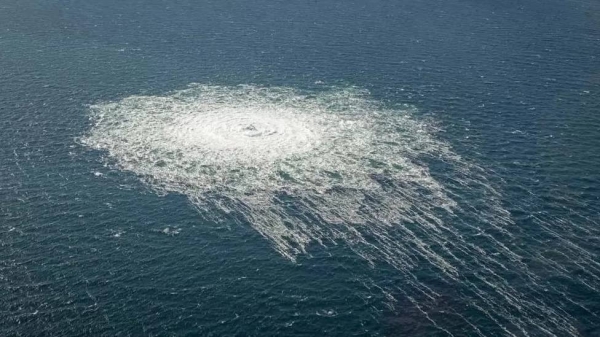
Last month, US President Joe Biden gave his first major international speech at the annual Munich Security Conference. He used the occasion to reaffirm America"s commitment to NATO and to highlight the threats posed by Russia and China to the transatlantic community.
Biden has also reversed a decision taken by former US President Donald Trump to remove almost 12,000 US soldiers from Germany. After four years of tense relations between Trump and some of his European colleagues, this was well received across Europe.
However, there is one area where the Biden administration is showing weakness and uncertainty when it comes to Europe’s security: The Nord Stream 2 pipeline.
Nord Stream 2 is a Russian gas pipeline that will connect Russia directly to Germany through the Baltic Sea. Russia prefers this method because it removes Ukraine from the transit route to European markets. Germany likes the pipeline because it allows them to consolidate even more power across much of Europe. The vast majority of European countries, especially from eastern Europe, are concerned about Russian dominance in the continent’s energy market.
The future of the Nord Stream 2 project is becoming one of the most contentious transatlantic issues currently debated in Washington. US Sen. Ted Cruz has pledged to hold up the confirmation of the next Central Intelligence Agency director in order to pressure the Biden administration into stopping the pipeline.
Last week, five US Congress members sent a letter to Secretary of State Antony Blinken calling on the Biden administration to implement sanctions under the “Protecting Europe’s Energy Security Act.” This bipartisan legislation came into force in January 2021 with the goal of stopping Russia from “using its energy resources for coercive purposes.” So far, Biden has refused to implement the sanctions and halt Nord Stream 2.
Europe already depends on Russian natural gas for 40 percent of its needs. In total, almost 200 billion cubic meters of natural gas are now imported from the country annually due to declining European production and rising demand. If Nord Stream 2 is finished, it will increase the continent’s dependence on Moscow for energy even more.
It is important to point out that Nord Stream 2 is neither economically necessary, nor is it geopolitically prudent. Rather, it is a political project led by German financial interests and Russian geopolitical machinations to greatly increase European dependence on Russian gas, magnify Moscow’s ability to use its European energy dominance as a political trump card, and specifically to undermine eastern and central Europe.
Europe needs to do a better job at diversifying its energy resources away from Russia. Luckily there are alternatives to Nord Stream 2. One logical area is the continent"s south. There are three initiatives that can help Europe achieve better energy security instead of relying more on Russia: The Southern Gas Corridor, the proposed Trans-Caspian Pipeline and the Three Seas Initiative.
First, the Southern Gas Corridor is a network of pipelines running 3,340 km across seven countries, with the potential to supply 60 billion cubic meters of natural gas to Europe. The Southern Gas Corridor was a success story if ever there was one in terms of regional energy projects. The first shipment of Caspian natural gas made its way to Europe using this new route on the last day of 2020 on time and below budget — a rare bright spot in an otherwise dismal year for geopolitics.
Second, there is also talk of finally building a Trans-Caspian Pipeline to bring natural gas from Central Asia to Europe bypassing Russia. Europe should be taking a leading role in making this proposal a reality.
A pipeline is the only economically viable way to move natural gas across the Caspian Sea. This means that right now there is no profitable way to get Central Asia’s gas to Europe without going through Russia or Iran. While a full-fledged pipeline should be the long-term goal, the transatlantic community should encourage Azerbaijan and Turkmenistan to construct an interconnector between two existing gas fields in the Caspian.
The new gas pipeline will increase Russia’s dominance in Europe.
Luke Coffey
Finally, Europe’s energy security can be bolstered by the Three Seas Initiative. Launched in 2016 to facilitate the development of energy and infrastructure ties among 12 nations in eastern, central and southern Europe, the initiative aims to strengthen trade, infrastructure, energy and political cooperation among countries bordering the Adriatic Sea, the Baltic Sea and the Black Sea.
As a vestige of the Cold War, most infrastructure in the region runs east to west, stymying greater regional interconnectedness. Developing north-south interconnections and pipelines will spur economic growth, prosperity and security.
After taking many positive steps to bolster transatlantic relations, one can only wonder why Biden is showing such weakness on Nord Stream 2. Of course, US-German relations were problematic during the Trump administration. However, for the sake of Europe’s energy security, and for the stability and security of Eastern Europe, supporting Nord Stream 2 just to improve US relations with Germany would only give short-term benefits. In the long term, it would make Europe and Germany’s energy security more vulnerable to Russia.
Luke Coffey is the director of the Douglas and Sarah Allison Center for Foreign Policy at the Heritage Foundation. Twitter: @LukeDCoffey
Disclaimer: Views expressed by writers in this section are their own and do not necessarily reflect Arab News" point-of-view










